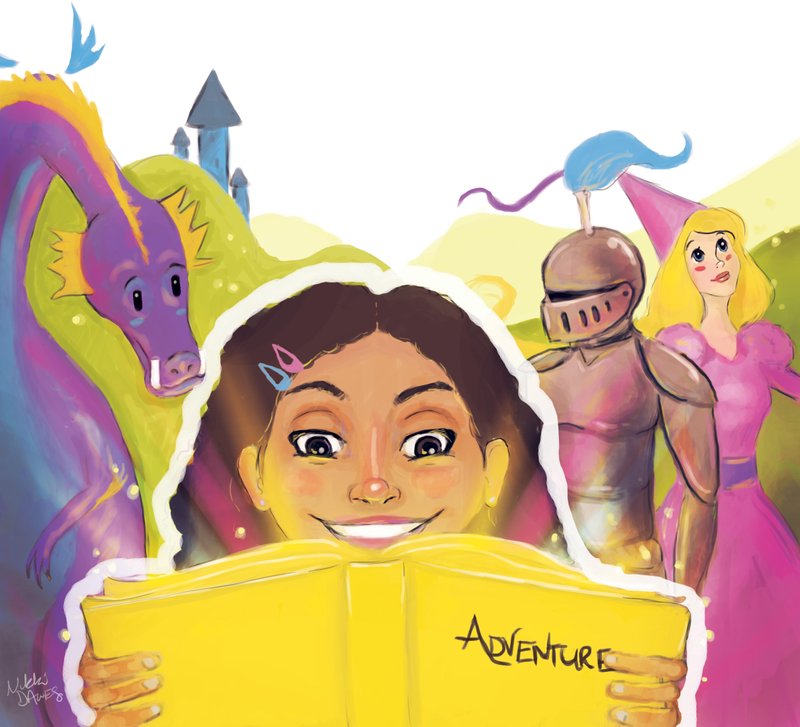Kids become lifelong readers for all kinds of reasons.
Sometimes there's one key book that captures the imagination and opens a child up to the exciting world of fiction. Other times, a teacher who assigns great books in class sparks a hunger for more big ideas and fine writing.
In some cases, parents influence kids' appreciation of books by sharing their love of literature and behaving like readers -- always having a book to read, taking books on vacation, reading before bedtime, making regular trips to the library and bookstore, etc.
Here are some tips for nurturing a love of reading that can last a lifetime:
• Read aloud: This comes naturally to lots of new parents, but it's important to keep it up. Kids will enjoy it longer than you think.
From babies, toddlers and preschoolers to kids in early grade school, it's wonderful to have a child on your lap, snuggled next to you on the couch, or drifting off to sleep in bed as you enjoy picture books together.
You may have to read your kid's favorite a hundred times, but just go with it. The child will remember the closeness as well as the story. Try nonfiction for those who are curious about pirates, Vikings, robots, castles, history, sports, biography, animals, whatever. For second- through fifth-graders, read those rich and meaty books that might be missed otherwise, such as classics like Treasure Island and Alice's Adventures in Wonderland.
Many parents think that as soon as their kids learn to read on their own, they no longer need to be read to. But children still love it and benefit from it as they hear the rhythm of the language, learn correct pronunciation and get to relax and just take it all in. Kids will get the idea that there's something worthwhile in books and that there's something special about time spent with a parent.
• Savor the series: It's common for kids to become book lovers for life after getting hooked on a series. And there are lots of good ones that keep readers hungry for the next installment.
Some reliable prospects: Ivy and Bean, Judy Moody for beginning readers; Harry Potter, A Series of Unfortunate Events and the Percy Jackson series for those in middle grades; and Hunger Games, Sisterhood of the Traveling Pants and Twilight (unless you think vampires are too creepy) for older kids.
• Grab onto a genre: Young readers go through phases of genres they're passionate about, from girl detectives to science fiction and fantasy. Don't get hung up on whether it's considered great literature (although some genre books are). Be happy that your child is devouring books one after the other.
• Feed the favorite-author addiction: Once children find a writer they love, they may want to read all of that author's books -- a great excuse for a trip to the library or an opportunity for book swapping among friends and classmates. Here are some good bets for favorites.
Younger kids: Dav Pilkey (The Adventures of Captain Underpants), Beverly Cleary (Beezus and Ramona). Middle grade: Kate DiCamillo (Because of Winn-Dixie), Neil Gaiman (The Graveyard Book). Tweens and teens: Judy Blume (Are You There God, It's Me Margaret) and Sarah Dessen (Just Listen).
• Count on the classics: Books are called classics because they continue to engage readers generation after generation. There are no guarantees, but you could try introducing children to books you loved as a child and see which ones click. Some good ones to try are the Dr. Seuss and Narnia books, Charlotte's Web and The Secret Garden.
m Find books about the things your kid loves: If the child adores horses, try Black Beauty. If he's wild about cars, trucks and trains, try The Big Book of Trains or The Rusty, Trusty Tractor.
Librarians, booksellers and Internet searches will help you find books on any topic.
• Funny is fine: Some parents wrestle with letting their kids read Captain Underpants, Diary of a Wimpy Kid and other edgy humor books about kids passing gas or getting into trouble. Talk to your children about the content, but keep in mind that they like these books not because they want to imitate the characters' actions but because they can live vicariously through the bad behavior. Humor is a great pathway to book loving.
• Comics are OK: Graphic novels are among the hottest trends in children's publishing, and they can get kids hooked on reading. Children may start with Squish and Babymouse and move on to Diary of a Wimpy Kid. But these series can also lead to more sophisticated fare such as Marzi and American Born Chinese.
• Engage with e-books: Kids can cuddle up with a Kindle, Nook or iPad. The electronic format has proved to be especially engaging for boys and reluctant readers, and you can download or access many books on an e-reader, which makes going digital a great choice for air travel and car rides.
But note that some studies show that book apps and interactive "enhanced" e-books, while fun, can be distracting and inhibit reading comprehension. So to promote reading skills and encourage a child to be a frequent reader, you might want to stick with e-books that have the look of a bound paper book. Some even have animation that mimics turning the pages.
• Make reading a family value: Actions speak louder than words. Take your kids to the library once a week or once a month to get new books, make regular outings to your local bookstore, hunt for low-cost books at used bookstores or secondhand shops, and show kids that finding a good book is like a treasure hunt.
• Fit reading into your family lifestyle. Set aside time for reading only -- turning off the TV, computer and cellphone. Encourage focused reading time, for either independent reading or reading aloud.
Take preschoolers to storytime hours at libraries and bookstores. For older kids, a parent-and-child book club can be fun.
So, yes, read to the children at bedtime. Provide time and space for your kids to read for pleasure in the car (if they don't get carsick!), on vacation, after homework is done, on their own before bed.
Warning: It could be habit-forming.
Common Sense Media is an independent nonprofit organization based in San Francisco that reviews media and technology intended for children, provides free research-based tools for teachers about technology in the classroom and advocates for digital access in schools as well as children's privacy.
Family on 03/18/2015

